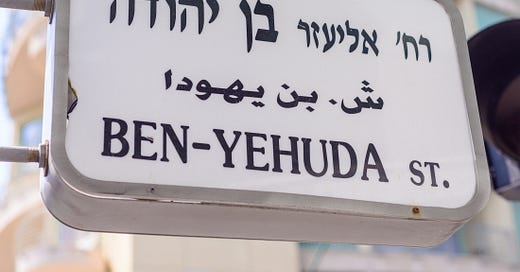I had such grandiose visions of spending much of my time in Israel writing up a storm, while simultaneously traversing the country, practicing my rusty Hebrew with the locals and soaking up the sun on the beach. Well, we’ve succeeded in traveling much of the country, absorbing many millennia worth of history and are getting quality time on the beach with the locals, but after almost two weeks here, I hadn’t yet opened my computer. The reason, I think is two-fold. I have too many complex thoughts swirling around in my mind and too little time to organize them properly. The terrain, culture, people and politics have moved and inspired me as I knew they would, but I think for now, I’ll keep it simple and provide you with a regional history lesson that will boggle the mind.
~~~~~
In my humble opinion, there is no accent that compares with that of the Hebrew speaker. It quite literally stops me in my tracks and makes my heart go pitter-patter. My kids have laughed at me for years, witnessing my predictable reaction every time I happen to stumble upon it spoken on the street. (As you can imagine, I’m in heaven right now.) You might argue with me that it doesn’t hold a candle to the romantic French enunciation or the sizzling Italian articulation or even the cheeky British intonation. But I’d insist you’re wrong. There is no better sound in the world, and as you’ll soon learn, it is quite miraculous.
The resurrection of the Hebrew language has been called one of the most remarkable linguistic achievements in human history. An ancient version of Hebrew existed over two thousand years ago, alongside other extinct languages such as Aramaic, Sumerian and Akkadian. Yeah, I’ve never heard of them either (well, tbh I know all about Aramaic, but that’s only because I’m a history nerd). Then, after the Destruction of the Second Temple in Jerusalem in 70 CE and the expulsion of the Jews to the far corners of the earth, Hebrew became much like Latin; a religious language kept alive mainly in sacred texts and uttered in prayer. But, it ceased to be a spoken vernacular for nearly two millennia. Jews living in the diaspora often spoke in unique dialects adopted from the native language of the regions where they settled, such as Yiddish for Ashkenazim and Ladino for Sephardim. But they did not speak Hebrew in their daily lives. Other ancient languages, such as Chinese, Farsi and Greek, have survived from their ancient civilizations, transforming and modernizing through the centuries, all having been spoken continuously throughout history as the mother-tongue of the inhabitants of that country, but none had become “inactive” for thousands of years, like Hebrew had.
So, how was Hebrew resurrected, you might ask? Settle in, and I’ll tell you. It started with the resurgence of the Zionist Movement in the late 19th and early 20th centuries. Simply, Zionism was founded on the belief that a modern Jewish state should be established in the Land of Israel, the Jewish ancestral homeland. Zionists believed that after millennia of antisemitism, persecution and expulsion, Statehood in the tiny strip of land to which Jews were indigenous, was the only means to self-determination and protection of the Jewish people.
During this time, one particular man, Eliezer Ben-Yehuda, made it his life’s mission to revive Hebrew as the official language of this emerging Jewish state. Understanding that the antiquated version of Hebrew was inadequate for a modern society, Ben-Yehuda undertook the daunting task of inventing thousands of new words and blending them with historical ones to ensure the authenticity of Hebrew while enabling it to sustain contemporary concepts. Think about that for a moment!! Reinventing a Biblical language to be the mother tongue of an emerging modern nation. He then started speaking this reinvented language exclusively at home with his family. His own son became the world’s first native speaker of Modern Hebrew. Astounding!!
Ben-Yeduda worked tirelessly for decades to ensure the success of his lofty vision of creating a whole nation of native Hebrew speakers. Could you imagine if he had taught his son a language no one spoke or understood? To make sure that didn’t happen, he compiled the first Hebrew dictionary, promoted the use of Hebrew in schools in pre-state Israel, advocated for all new Jewish immigrants to be taught Hebrew and encouraged its use in daily life. And you already know how this remarkable story ends; he ultimately succeeded in making it the official language of first, the British Mandate and then later, the State of Israel.
So now you see; Hebrew is the unique example in history of the complete revival and modernization of an ancient and unspoken language. Today, it is the native language of millions. I marvel every time I hear toddlers prattle off in Hebrew, effortlessly, nailing the guttural and harsh sounds with their high-pitched baby voices. it is the result of the dream of one ambitious man, and the sheer cultural determination of a people with an unparalleled national identity.




I'm sorry that you didn't write anything on your trip. I'm looking forward o your next novel!